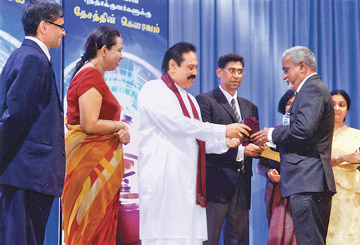Rubber forays into Dry Zone
By L.S. Ananda WEDAARACHCHI
 |
|
Karunasena receives the
Presidential Award from President Mahinda Rajapaksa |
Rubber cultivation is extended to many parts of the island to meet
the local and international latex demand, said Plantation Industries
Ministry Secretary Sudharma Karunaratna.
She said that the world market price for natural rubber is soaring
due to world oil crisis.
The Sunday Observer interviewed Plantation Industries Ministry
Secretary Sudharma Karunaratna.
Excerpts of the interview:
Q: Rubber plantation has been confined to the wet zone. Experiments
were conducted few years ago to expand rubber cultivation to Moneragala
and Hambantota districts in the dry zone. What progress have you
achieved in the experiments.
A: Experiments have proved that rubber could be cultivated in the dry
zone areas. Over 5,000 ha in the Moneragala district are under rubber
cultivation. The weather in the Moneragala district has changed due to
the rubber cultivation according to experts.
The 2011 budget has proposed to plant rubber in 10,000 ha of
untilized land in the Ampara district on the evaluation of performance
in the Moneragala and Hambantota districts.
|

Sudharma Karunaratna. |
An action plan has been formulated on the proposed rubber cultivation
in the Ampara district and a 50-acre rubber nursery has been set up in
Padiyatalawa.
Q: Are there plans to extend rubber plantation to the Northern and
Eastern provinces where there is plenty of unutilized land?
A: The Rubber Development Department (RDD) had already launched pilot
rubber cultivations in Mullaitivu and Killinochchi districts.
Many programs have been held to enlighten the people in this regard.
Q: Will the rubber plantation affect the traditional paddy
cultivation in these districts.
A: Most of the people in the dry zone continue to engage in the
traditional chena cultivation during the rotation period.
Those lands can be used for rubber cultivation productively and also
ensure a more healthy ecological environment.
Q: Rubber could be tapped after five or seven years. Will such a long
period affect cultivators who had given up chena cultivation?
|
Presidential award for knife
inventor
 Ruwanpura Karunasena, an experimental officer of the Sri Lanka Rubber
Research Institute won the presidential award for his technically
improved knife for rubber tapping at the presidential Award ceremony
held at Temple Trees last February. Ruwanpura Karunasena, an experimental officer of the Sri Lanka Rubber
Research Institute won the presidential award for his technically
improved knife for rubber tapping at the presidential Award ceremony
held at Temple Trees last February.
Karunasena said that his invention helps secrete more latex. It also
protects the cambium of the tree unlike the conventional knife which
always runs the risk of damaging the tree, he said. Very often the
unskilled tappers damage the rubber tree, he said.
The new knife could be bought at the branch of Rubber Research
Institute Ratmalana at a nominal price, he said.
He said that he hopes to support the rubber industry with more
inventions. |
A: Various inter crops such as pineapple, Manioc, sweet potatoes and
passionfruit could be cultivated in rubber lands.
This is being done by the rubber smallholders and rubber companies in
traditional rubber districts such as Kegalle, Ratnapura and Kalutara.
Q: The government has introduced the subsidy schemes to encourage
replanting of rubber when the rubber prices dropped a few years ago
cultivators switched to other profitable crops. What is the present
situation?
A: Subsidies for the new and replanting of rubber have been increased
to Rs.150,000 and Rs.175,000 per ha.
Q: What are the rubber cultivation targets for the next few years.
A: According to the surveys conducted by the RD Department the
suitable districts have been identified for rubber cultivation. The
present rubber acreage of 126,600 will be increased by over 30 percent
within the next four years.
Q: In addition to subsidies what are other forms of assistance
provided for rubber cultivators.
A: Several schemes for the benefit of rubber cultivators have been
introduced. The RD Department has a regional network to assist the
people in various forms.
The field officers in the regional offices are regarded as the
conduit to interact with the cultivators.
The fertilizer subsidiary scheme of the government has been extended
to rubber as well. The smallholders could obtain technical and other
assistance from the RDD regional offices in all districts
|

